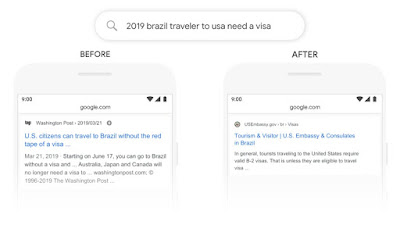 |
| Effects of BERT update |
Google recently released an update that affected one in ten
search queries. The BERT update essentially changed the rank of the search results
based on these queries. While this may not sound significant, it is considered
as one of the biggest updates since RankBrain was released in October 2015. But
before we look at its effects on a website, let us take a look at some facts
about this update.
BERT Update
The BERT is an acronym for Bidirectional Encoder
Representations from Transformers. It is an update open-sourced by the internet
search giant. This is a natural language processing update, which allows Google
to better understand what users want to find on the internet. Previously,
Google would show results based on the individual words of a search query.
While this is a simple way of showing the results, it does not accurately
provide the result a user may want. With the new update, it takes into account
all the words in the query and how each word is related to the other words
before showing the result.
Even as this may sound a bit confusing to ordinary users,
professionals offering digital marketing services are gradually trying to
find ways to improve the rank of the websites they are handling on Google. To
better understand the update, let us take a look at some of the examples
the search giant provided. For instance, when someone types “can you get
medicine for someone pharmacy” on Google, the result before BERT showed
information about filling prescriptions. But after the update, Google took into
account “for someone” in the search results and showed results about someone
picking up medicine from a pharmacy for a friend or family member. Similarly, a
search query about “math practice books for adults” previously showed math
books in the young adult category. After the update, the result showed math
books designed for adults or Google was able to understand the context of the
word adult in the search query.
Effects of the BERT
update
BERT simply teaches the search engine on how to understand
the different nuances about natural language. It allows Google to better know
what users are looking for. It essentially teaches Google to understand users like
a human rather than a robot. Due to this, the latest update is beneficial for
content writers who are writing for the reader than writing for the machine. Digital
marketers are in agreement that there is no way to optimize for BERT for the
moment. Due to this, it is advisable not to make any changes to the
optimization of your websites. Any onsite or offsite SEO or search engine
optimization activities should not change. Instead, marketers should focus on
content.
 |
This was echoed by Danny Sullivan, the search liaison of
Google. He said the update does not change the fundamentals they have been
promoting over the years. He said the content should be written for the users.
He further added that the length of the content does not have any significant
effect on the search rankings following the update.
What You Can Do
Due to this, professional digital marketing services should focus on providing quality content for their
clients. The content should provide something useful for readers. Similarly, you
should also do the same thing for your own website. Getting a good content
writer who can provide high-quality articles will be the first step in dealing
with the BERT update. While keywords are still important, Google will now take
the whole context of the search into account. Due to this, website owners and
digital marketers should focus on content rather than simply optimizing the
website to rank well in the search results.
Even as the update was already released, you should
understand that you still have a lot of work to do to ensure your website will
rank well on the Google search results.















































